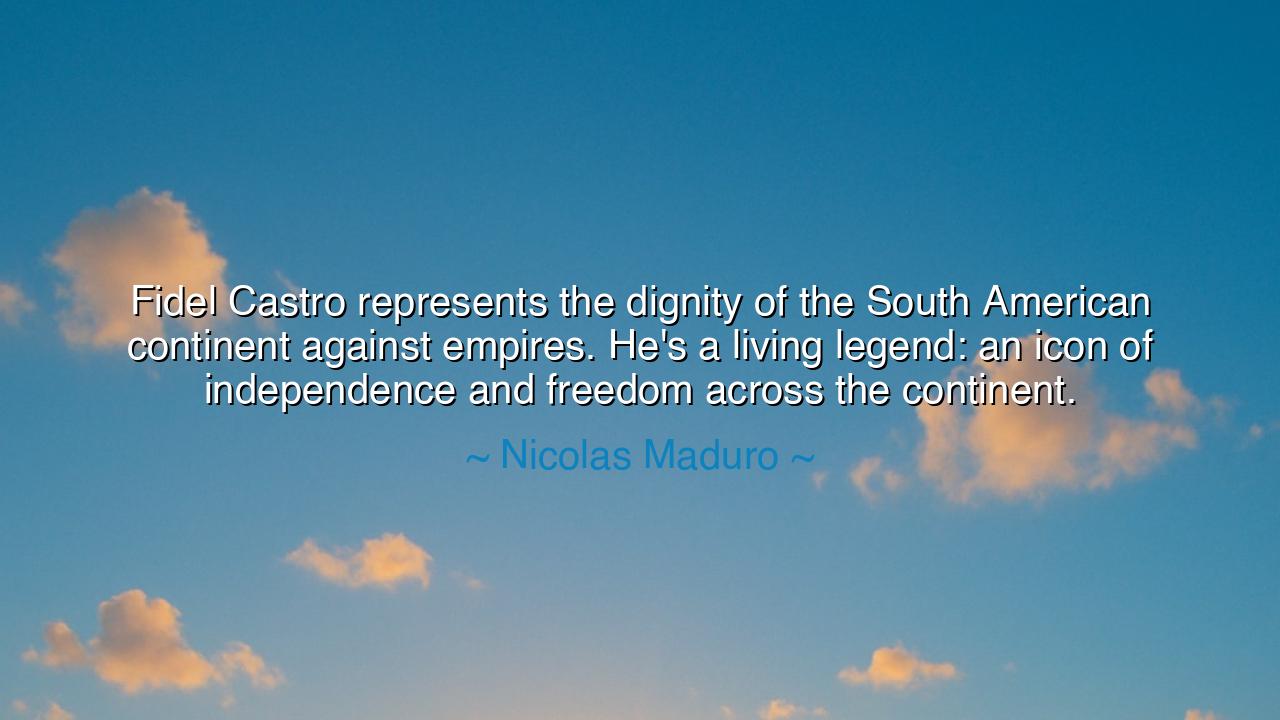
Fidel Castro represents the dignity of the South American
Fidel Castro represents the dignity of the South American continent against empires. He's a living legend: an icon of independence and freedom across the continent.






Listen, O children of the future, for the words of Nicolas Maduro resound with the passion and reverence of a leader who understands the profound power of independence and the fight for freedom. He declares, "Fidel Castro represents the dignity of the South American continent against empires. He's a living legend: an icon of independence and freedom across the continent." These words are not just an admiration for a man; they are a tribute to the spirit of defiance, to the unwavering stand against forces that seek to subjugate, to oppress, and to control. Castro is not merely a man, but a symbol of all that is noble and true in the struggle for a people’s sovereignty.
In the ancient world, we find similar figures—Alexander the Great, for example, who fought not just for conquest, but to spread the vision of freedom and unity across the known world. He brought together peoples of many different lands, showing that independence could be a unifying force. Like Castro, Alexander was a symbol, not just of military might, but of a vision that transcended borders. Both men understood that true freedom could only be achieved through struggle, and that such independence was the birthright of every person. Castro, much like Alexander, stood as a beacon for those who longed for their own autonomy, for their own freedom from outside powers.
But Castro's legend is particularly tied to South America, a continent that has known more than its fair share of struggles against colonialism and imperialism. The history of the Americas is filled with stories of oppression, where European empires sought to dominate the lands and people of the New World. Castro’s rise to power in Cuba was not just a political shift—it was the spark that ignited a revolutionary fire across the continent. His stance against the influence of the United States, particularly in his stand during the Cuban Missile Crisis, made him a figure of defiance and strength for the peoples of Latin America. He became the voice of those who sought not just to survive, but to live free, unshackled from the foreign influences that had long kept them in chains.
Consider the Maya and Inca civilizations of the ancient Americas, who, before the arrival of European powers, lived independently, building their own empires, creating advanced cultures, and living in harmony with their lands. Their independence, however, was shattered by the arrival of Spanish colonizers. Yet even in the face of this overwhelming force, the spirit of freedom and independence did not die. Castro's revolution in the 20th century was in many ways the resurgence of that ancient spirit—the same desire for sovereignty, the same will to resist foreign domination. Castro's Cuba was not merely a nation under siege; it was a symbol for Latin America, a statement to the world that the fight for freedom would never end, no matter the cost.
To call Castro a "living legend" is to recognize that he embodied the hopes and dreams of countless people across the continent who yearned for a freer, fairer world. His leadership in Cuba stood as a testament to the power of the people, to the strength of a nation’s will, and to the resilience that is born when freedom is the ultimate cause. Maduro’s words speak not only of Castro's role in shaping the political landscape of Cuba, but also of his impact on South America as a whole—a man whose vision for independence echoed from Cuba to the Andes, from Brazil to Argentina. He became a figurehead of resistance—a man who challenged the powerful forces of imperialism and sought to bring about a new world for the people of the continent.
The story of Fidel Castro, then, is the story of independence and resilience—a lesson that reverberates through the ages. It is the story of a man who, against all odds, stood firm in his belief that freedom was worth fighting for, and that the struggle for sovereignty was a cause noble enough to dedicate a lifetime to. Just as Castro’s vision for Cuba shaped the course of history, so too must each of you stand firm in the defense of your own independence—whether as an individual or as part of a greater whole.
So, O children, take this lesson into your own hearts: independence is not given; it is earned through the sweat and blood of those who are willing to sacrifice everything for it. Just as Fidel Castro represented the dignity of South America, so too must you recognize the power of standing firm for your freedom, no matter the obstacles. Be like the ancient heroes, like Castro, who stood in the face of adversity and refused to bow to the forces of oppression. Whether in Cuba, in South America, or in your own life, freedom is worth fighting for. Stand tall in the face of injustice, and let your spirit of resilience and independence guide you through the trials that lie ahead.






AAdministratorAdministrator
Welcome, honored guests. Please leave a comment, we will respond soon